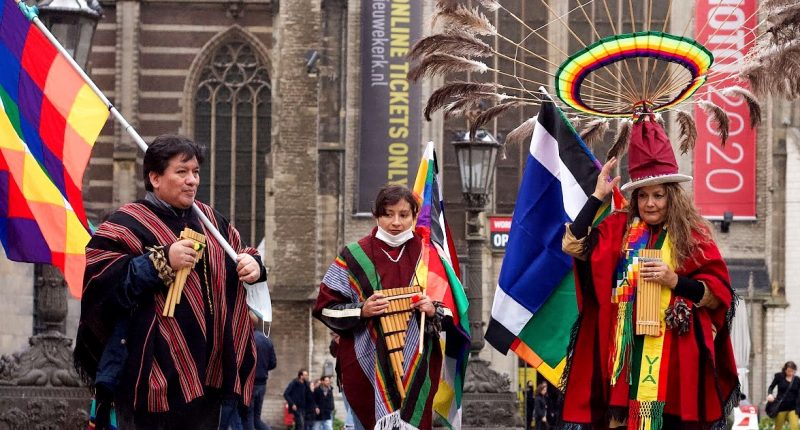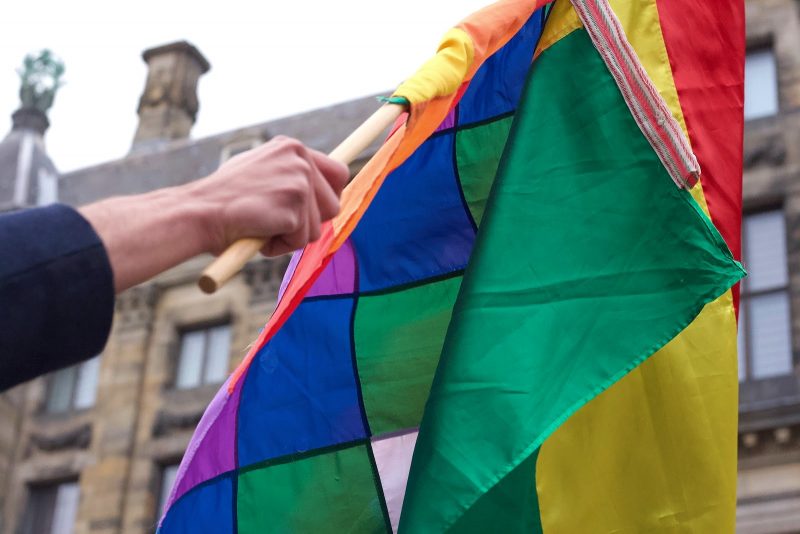With candles, incense and dancing, Bolivians abroad celebrated the government change

Demonstrators dressed in celebratory outfits at Dam Square. Ivonne, one of the demonstration’s organizers, is pictured in the middle. Photo by the author.
“Jallala!” cheered dozens of demonstrators on Amsterdam’s Dam Square on Saturday, October 24. The demonstration was organized in celebration of Luis Arce’s presidential win in Bolivia, which was confirmed a day before.
Against the Dutch buildings’ brick facades, whipalas— colorful, checkered flags representing some of the Andean native populations—fluttered in the wind. Jallalla means “long live” or “live well”, in Aymara, as Ivonne van Pelt, one of the demonstration’s organizers, told Global Voices. “In our culture, we don’t say ‘good morning’ or ‘good afternoon’,” she explained. “We say ‘live well’.”
The demonstration was organized by Whipalas Across the World—”an alliance of Bolivian collectives, cultural and social groups based mostly in Europe.” It consisted of a homage to the 2019 massacres of Scaba, Senkata, and Pedregal, a homage to Mother Earth, dancing, and an apthapi. “It was not easy to organize the party during the pandemic,” van Pelt told me. “We used technology and social media. Whatsapp to communicate. YouTube to practice the choreography. Facebook to publish the event.”

Demonstrators and a crowd listen to speeches. Photo by the author.
On October 23, Luis Arce emerged as the winner of Bolivia’s 2020 presidential race with 55.1 percent of the vote; center-right politician Carlos Mesa came in second with 28.8 percent. Arce’s victory marks a return to power for political party Movimiento al Socialismo (MAS), which was previously led by Evo Morales until accusations of electoral fraud followed by mass protests forced him to step down in November 2019.
Arce, the former Minister of Economy and Public Finance under then-President Morales, will take over the presidency from right-wing politician Jeanine Áñez Chávez who assumed the interim presidency after Morales stepped down.
For many Bolivians, memories of Áñez’s short presidency are tainted by corruption and state violence. “Dictatorship” was the word demonstrators at Dam Square often used to describe Mrs. Áñez’s interim administration.
On November 15, three days after assuming power, Áñez signed a decree that “gave impunity to military personnel involved in the repression of protests” that had occurred that month. This piece of legislation was subject to heavy criticism by several human rights organizations. The Inter-American Commission on Human Rights, for example, claimed that the Bolivian armed forces facilitated the “Sacaba massacre,” in which twelve civilians lost their lives.
Áñez’s period in power was also marked by heightened ethnic tensions, according to journalists and academics. Her initial cabinet did not “include a single indigenous person, in a country where at least 40% of the population belongs to one of 36 indigenous groups,” writes the Guardian. During a recent Zoom conference organized by Whipalas Across the World, Bolivian political scientist Jorge Richter also condemned the interim administration for promoting racial and ethnic intolerance. “They [the Áñez administration] hate indigenous people,” van Pelt added during a follow-up interview via WhatsApp.
Religion also proved to be polarizing during Áñez’s interim presidency. Bolivia’s constitution puts Christianity on equal ground with other religions, yet “…The Bible has returned to the government palace,” Añez stated when she was sworn in. Añez’s Christian fervor was previously analyzed by Global Voices.
For Bolivians at home and abroad, the 2020 elections were an opportunity to reverse the country's political course and a chance to repair the nation.
Others see the MAS as a defender of national interests. As van Pelt told Global Voices, before Evo gained power, “we exited a state of total submission in which [our resources] passed from one entrepreneur to the next, in which we could never be the owners of our own resources.” With the MAS in power again and with a new leader, Bolivians have hope that decision-makers will represent the national interest instead of serving foreign companies.

Whiplalas waved in the air. Photo by the author.
All over Europe, Arce's victory set off celebrations amongst like-minded Bolivians. Despite many not having lived in their country for a long time—many Bolivians emigrated to Europe because of US-sponsored military coups in 1971—the Bolivian diaspora still has strong emotional ties to the people back home. “My true family is back in Bolivia,” van Pelt told Global Voices on Saturday. Bolivians abroad were allowed to vote.
In Amsterdam, diasporic Bolivians held a ritual thanking Pachamama (Mother Earth) for Arce’s victory, during which two demonstrators spread petals in the wind, lit incense, and gave speeches—mostly in Dutch, but also in the Quechua and Aymara languages—as they sat on a colorful mantle surrounded by flowers and candles. Equality—both in a political and spiritual sense—was at the heart of their rhetoric. “We are all the same before Pachamama,” a demonstrator told the small crowd huddled around the altar.

Demonstrators perform a ritual, give speeches, and recite poetry. Photo by the author.
To conclude the ritual, Ramón—pictured on the left—poured water on the ground. Later on, an onlooker asked van Pelt why he did that. “We believe that when nature gives us something, we have to give back,” she said. Pouring water on the ground symbolized that.
After the ritual, a celebration ensued. An assortment of Latin American music boomed from speakers and people danced. “There is nothing like Latin music,” van Pelt told Global Voices. Honoring a promise she had made before the elections, one demonstrator danced two laps around the square barefoot, then followed by several others.

A demonstrator takes off her shoes as she prepares to dance around the square. Photo by the author.
Several onlookers joined in. Nick, a 20-year-old man from Brazil, told Global Voices why he was there. “I am just a guy who likes celebrating and dancing to the freedom of a nation,” he responded. He also believed the occasion was something all Latin American people should laud. “Bolivia has set an example,” he said.

Nick waving a Whipala. Photo by the author.
Nick was not the only non-Bolivian there. People from Latin American countries, like Curacao, Surinam, Mexico, Argentina, and Colombia, were also in the crowd. The Surinamese and Venezuelan flags were visible during the celebration. Bolivians welcomed other Latin Americans warmly, calling the continent, “one big family.”
“All of us Latin Americans have to come together to fight imperialism,” van Pelt said.

Gabriella hands out cups and plates. Photo by the author.
After around an hour of dancing, the demonstrators brought out food and drinks, laying them neatly on a mantle spread out over the concrete. This sort of “picnic” is called an apthapi in Aymara, which Gabriella—who invited me to the demonstration—said meant “union and the power to share […] in the Aymara, Guraní, and Quechua cultures.” The onlookers were offered tangerines, vegetables, wine, and soft drinks from the apthapi.

The apthapi. Photo by the author.
The evening was not without tensions. The demonstrations were allowed under COVID-19 restrictions, but in practice, it proved difficult for people to keep 1.5 meters apart, as stipulated by Dutch law. The police intervened, and the organizers agreed to enforce social distancing rules more strictly.
The evening was peaceful and joyous overall, and a sense of relief was palpable. “The people are finally back in power,” a demonstrator said in the crowd.
Post a Comment